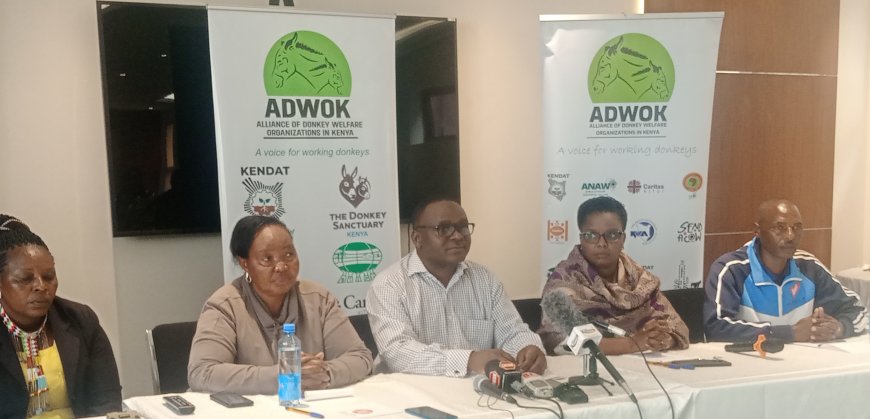Stakeholders call for cessation of plans to reopen mass donkey slaughter in Kenya

Nairobi Thursday June 22, 2023
KNA by Joseph Ng’ang’a
Alliance of Donkey Welfare Organizations in Kenya (ADWOK) and the Association of Donkey Owners in Kenya (ADOK) have called on the government to reconsider the planned reopening of donkey slaughterhouses.
They said that as donkey-dependent communities the move will greatly affect their livelihoods and called on Agriculture and Livestock Cabinet Secretary (CS) Mithika Linturi to reconsider the planned reopening and call for a stakeholders meeting for insights over the same.
Addressing the press on Thursday, ADWOK chairman Titus Sagala said that reopening of the slaughter houses would be detrimental to the welfare of donkeys and the economy of Kenya as it does not provide sustainable job creation.
“Slaughter of donkeys has proven to destroy the livelihoods of youths, women, and children. We acknowledge that donkeys are livestock and have played a critical role in supporting community livelihoods as working animals, assisting with household chores, and generating income,” said Sagala.
He explained that the use of donkeys to earn income aligns with the Bottom-Up Economic Transformation Agenda under President William Rutos’ administration since it assists people at the bottom of the pyramid.
“In his statement, Linturi sought evidence to inform his decision on reopening the slaughterhouses. We would like to say that donkeys are working livestock, and their contributions to food security and nutrition have been officially recognized by the UN Committee on World Food Security (CFS) on October 17th, 2016, in Rome,” said Sagala.
He explained that according to a 2019 research conducted by the Kenya Agricultural and Livestock Research Organization (KALRO) on the "Status of Donkey Slaughter in Kenya and Its Implication on Community Livelihoods," each working donkey in Kenya generates an average of Sh11, 390 per month and supports up to seven family members.
“The same research report reveals that over a span of three years (2016-2018), the four donkey abattoirs located in Nakuru, Baringo, Turkana, and Machakos counties in Kenya decimated 301,977 of the country's donkey population, accounting for 15.4 percent. The annual mean rate of donkeys slaughtered (5.1%) was five times higher than the annual donkey population growth rate (1.04%). If the trend had continued, Kenya would have completely depleted its donkey species by 2023,” he said.
Sagala highlighted that the donkey population in Kenya has plummeted from 1.9 million in the 2009 census to 1.1 million in the 2019 census.
“The research further reveals that the four slaughterhouses employed 657 workers, who earned a daily wage of Sh. 423,” he said.
According to Sagala, a comparative analysis between the value of donkey meat and hide exported and the income foregone from working donkeys between 2016 and 2018 reveals that over 300,000 donkeys were slaughtered, generating a gross revenue of Sh.1.82 billion from donkey meat and skins. However, if only 25 percent of the slaughtered donkeys were working donkeys, the foregone income would amount to Sh.28.3 billion.
He further explained that Tanzania, Uganda, Botswana, Burkina Faso, Niger, Mali, Senegal, Ivory Coast, Ghana, and Nigeria have banned donkey slaughter on various dates, and Kenya banned slaughter in 2020.
“All these countries have experienced negative consequences of donkey slaughter, including exploitation, non-compliance with laws and government directives, loss of donkey-dependent community livelihoods and resilience, and animal welfare concerns,” he said.
Sagala said that the Pan African Donkey Conference, hosted by AU-IBAR in Dar-es-Salam, Tanzania, resolved to urge all governments, based on the available evidence of the alarming decline in donkey numbers on the continent, to impose a ban on donkey slaughter and skin trade for at least the next 15 years.
“Donkey-owning communities have previously petitioned the government on multiple occasions, calling for a ban on the trade due to the resulting theft of donkeys.
He continued… “Given this wealth of evidence, we urge CS Linturi to reject any plans to reopen donkey slaughterhouses as a means of employment creation, as it will ultimately impoverish youth and communities dependent on donkeys.”
Association of Donkey Owners in Kenya’s (ADOK) Robert Maitethia said that as donkey owners they are not willing to sell their animals for slaughter and if the slaughterhouses are reopened then it will open a floodgate for theft of their donkeys.
Maitethia said that theft of donkeys during the times when the slaughter houses were opened affected their livelihoods since they depend on donkeys to fetch water, firewood, carry farm produce and other chores which are done by women and children in the absence of donkeys and thus it impacts the children’s education.
Margaret Mbatia a donkey owner from Narok County said that a donkey is like a co-wife since it assists in many household chores like fetching water and firewood.
“Donkeys have helped in the improvement of our health. We used to have back problems from carrying water on our backs and also head problems for carrying water on our heads but when we acquired donkeys all these are problems of the past,” explained Mbatia.
A bitter Mbatia expressed her sadness to hear that there are plans to reopen the slaughter houses as she explained how their donkeys were stolen and sold to the slaughter houses forcing the villagers to share the donkeys among themselves seeing that their neighbours were suffering.
“We will do whatever it takes to ensure that the slaughter houses are not reopened and even if it means we camp outside the slaughter houses we will do so. We are also planning to hold peaceful demonstrations to urge the government to reconsider the reopening of donkey slaughter houses,” said Mbatia.
Courtesy ; K. N. A
What's Your Reaction?



































































































































































































































































































